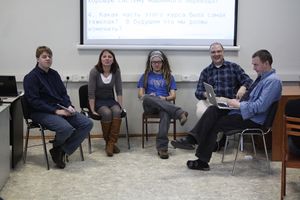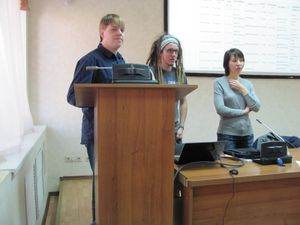FAQ/Shupashkar and Qazan 2012
A FAQ to explain my (Jonathan Washington's) trip to Shupashkar and Qazan in January of 2012.
Course on Machine Translation of the Languages of Russia

In late January 2012 (Monday the 23rd through Friday the 27th), the Apertium project led a course on machine translation for the languages of Russia at Chuvash State University in Shupashkar (Cheboksary, Chuvashia).
I was one of the invited teachers, given my knowledge of Turkic languages, my experience with Turkic morphological transducers, and my background in linguistics. The remaining teachers were Francis Tyers and Trond Trosterud. Hèctor Alòs i Font took care of logistics for the course. There was also a translator available to us throughout the course, but I gave all my lectures in Russian and interacted with the students directly in Russian (and Tatar when appropriate).
We taught a group of over 20 participants (philologists, linguists, and computer scientists from Tatarstan, Udmurtia, Komi Republic, Mari El, Bashqortostan, Chuvashia, Kirov, Perm, Moscow, St. Petersburg, and Latvia), who over the period of 5 days learned how to build a machine translation system from scratch with the Apertium platform. In that time, each participant managed to create a basic machine translation system between a pair of languages (including Chuvash-Turkish, Udmurt-Russian, Tatar-Bashqort, and Finnish-Estonian). Several of these projects are being actively continued, and we hope to see computational resources for the languages of Russia grow.¹
There are pictures of the course and my time in Shupashkar on facebook.
Round table on Machine Translation in Qazan

We were also invited to Qazan (Kazan, Tatarstan) after the end of the course (on the 28th), to present and lead a round table on machine translation for the last day of TEL, a conference about technology related to linguistic corpora of national languages, hosted by The Institute of Applied Semiotics, part of the Academy of Sciences of the Republic of Tatarstan.
After our discussion with them, the group there became interested in developing a Turkish-Tatar machine translation system, which we're currently assisting them to get under way.
There are pictures of the round table and my time in Qazan on facebook.
Footnotes
- The morphological transducers developed to parse and generate forms in each language can also be turned into spell checkers, for example, and have quite a few other purposes besides (such as being the basis for predictive text entry on mobile devices).